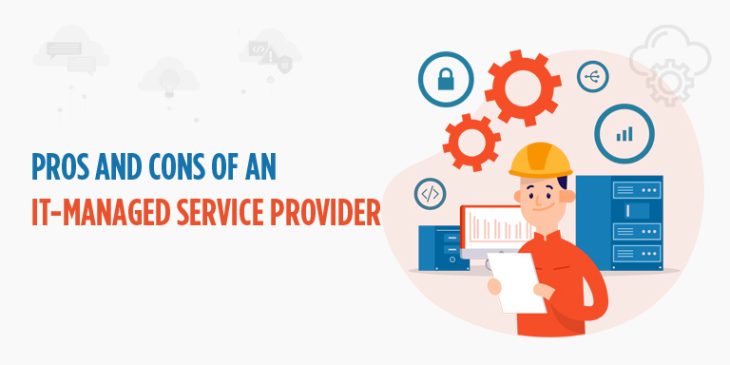
- June 15 2023
- admin
In today’s technology-driven business landscape, organizations often face the decision of whether to manage their IT infrastructure in-house or partner with an IT managed service provider (MSP). An MSP offers a range of services, from network monitoring and data backup to cybersecurity and cloud management. A prospective MSP like Kryptos would handle all maintenance and updating tasks. This allows the senior management to focus on their business priorities than bothering about the organization’s IT functionality.
Kryptos, with more than fifteen years in the industry as a trusted Managed IT Services, would evaluate and assess the current and future IT requirements of the client and would advise on the right services and solutions that the business should implement for the next year. In this blog, we will explore the pros and cons of engaging an MSP, helping you make an informed decision about whether it is the right choice for your business. Learn more on DesignRush
Pros of an IT Managed Service Provider:
- Expertise and Specialization:
One of the primary benefits of partnering with an MSP is gaining access to a team of highly skilled professionals with specialized knowledge in various IT domains. MSPs employ experts in networking, cybersecurity, cloud computing, and more. This expertise ensures that your organization receives top-notch service and support, leveraging the latest industry best practices and technologies. - Cost Savings:
Engaging an MSP can often result in significant cost savings compared to maintaining an in-house IT department. MSPs typically offer flexible pricing models, such as monthly subscriptions or pay-as-you-go options, allowing you to align your IT expenses with your business needs. Additionally, you can avoid the costs associated with hiring, training, and retaining IT staff, as the MSP handles all staffing requirements. - Scalability and Flexibility:
As your business grows or experiences fluctuations in demand, an MSP can quickly adapt to meet your evolving IT needs. Kryptos offers scalable solutions, allowing you to easily increase or decrease services based on demand. Whether you need to add new users, expand your network infrastructure, or integrate cloud services, an MSP can provide the necessary resources and expertise without disrupting your operations. - Proactive Monitoring and Maintenance:
An MSP takes a proactive approach to IT management, continuously monitoring your systems for potential issues and applying necessary updates and patches. By detecting and addressing problems before they escalate, an MSP helps minimize downtime, maximize system uptime, and improve overall IT performance. This proactive maintenance can lead to increased productivity, reduced disruptions, and enhanced user satisfaction. - Business Continuity:
Business owners do ponder the business backup plan in case of any disasters, to restore all the systems & saving sensitive data in case of any unexpected occurrence. This is where IT Managed Services would reap ample benefits. An efficient MSP would create a fool-proof disaster recovery plan and ensure the business runs smoothly.
Cons of an IT Managed Service Provider:
- Loss of Control:
Entrusting your IT operations to an external entity means relinquishing some level of control over your systems. While MSPs work closely with their clients to align services with business objectives, the ultimate decision-making authority rests with the MSP. This loss of control may not align with the preferences or operational strategies of certain organizations, especially those with strict compliance or security requirements. - Dependency on Service Provider:
Relying on an MSP for critical IT functions means becoming dependent on their services. If the MSP experiences disruptions or fails to deliver as expected, it can impact your business operations. It’s crucial to thoroughly evaluate an MSP’s reputation, reliability, and service-level agreements to mitigate the risk of potential service interruptions or unsatisfactory performance. - Data Security and Privacy Concerns:
Sharing sensitive data and granting access to an external party raises legitimate security and privacy concerns. While reputable MSPs prioritize security and implement robust measures to protect client data, there is always a risk of breaches or unauthorized access. It’s vital to conduct due diligence when selecting an MSP, ensuring they have comprehensive security protocols and comply with relevant regulations. - Communication and Responsiveness:
Effective communication and timely response are essential in any IT support scenario. Some organizations may find it challenging to establish clear lines of communication or experience delays in issue resolution when working with an MSP. It is crucial to define expectations, establish service-level agreements, and regularly communicate with the MSP to ensure alignment and address any concerns promptly.
Engaging a Managed IT service provider offers several advantages, including access to expertise, cost savings, scalability, and proactive support. However, it also comes with potential drawbacks related to control, dependency, data security, and communication. Before making a decision, carefully assess your organization’s specific needs, evaluate different MSPs, and consider the pros and cons outlined in this article. By doing so, you can make an informed choice that aligns with your business objectives and ensures efficient IT operations.